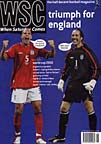 David O'Byrne saw the Turkey outdo all World Cup expectations despite Hakan Sukur's baleful influence
David O'Byrne saw the Turkey outdo all World Cup expectations despite Hakan Sukur's baleful influence
Before the start of the World Cup, few Turks had expected their team to last as far as the semi-finals. After the first two group matches, that number had shrunk considerably. As a scenario of failure, relinquishing a one-goal lead not once but twice had a distinctly familiar ring. A decade of senselessly chucking away promising positions was capped last November when Turkey gifted Sweden two goals in the last three minutes of the final qualifying match, leaving them to face a play-off against Austria.
The Turkish press reacted predictably after the last-minute defeat to Brazil, rounding on South Korean referee Kim Young-joo for the penalty decision and failing to spot Rivaldo’s play-acting. But there was criticism of the Turkish side too. The biggest selling football daily, Fanatik, dubbed the game The Good, the Bad and the Ugly, doling out disapproval in equal measure to the ref and the red card recipients, Alpay Ozalan and Hakan Unsal. However, most criticism during the entire campaign was reserved for the coach Senol Gunes, who was still being accused of profiting with a team largely built by his predecessor but one, Fatih Terim, lately of Milan. As recently as March, the Turkish media was calling for Terim to be brought back.
Gunes saw his position compromised further by Hakan Sukur’s complaints to the popular rightwing daily Hurriyet that his complete anonymity in both games was due to the midfield which was “only thinking of personal glory” and wouldn’t pass the ball to him. Which was hardly a useful comment, given that the midfield – notably Hasan Sas, Yildiray Basturk, Emre Belozoglu and Umit Davala – had been outstanding. Sukur later claimed his remarks had been made off the record, a claim that stretches credulity. Having been a star for the past 13 years, Sukur more than anyone knows how the Turkish media works and has been happy to use it to his advantage.
Unfortunately for him his moaning, rather than bringing criticism on his team-mates, simply drew further attention to the fact that the man once dubbed “The Bull of the Bosphorus” had been universally rated the worst player on the pitch against Costa Rica, and was now bleating like a distressed lamb.
Some sections of the media called for “Big Hakan” to be dropped, comparing him unfavourably with the much faster Ilhan Mansiz, the Turkish league’s top scorer last season, who had been restricted to late appearances as a substitute in the group games. To the outsider, the case seemed pretty simple. But Ilhan’s background continues to be seen as a problem. Born and brought up in Germany, he found it impossible to adapt to Turkey when first arriving as a player aged 19, and by his own admission he still doesn’t feel at home there. Such honesty has done little to endear him to Turkey’s conservative and often xenophobic football media which, along with much of “middle Turkey”, has long found common cause with Sukur’s openly voiced conservative values. (Sukur has declared his intention of making the pilgrimage to Mecca, and hosted several controversial rightwing politicians at his wedding a few years back.)
With no injury or suspension worries, the semi-final clash left Gunes with one simple decision to make. Chants of “Il-han Man-Siz, Ha- kan Fikir-siz (clueless)” in Istanbul bars following Ilhan’s golden goal victory over Senegal, punctuated what was without doubt the biggest and wildest party the city has seen and indicated the strength of popular feeling on the subject.
But Sukur’s appearance in the starting line-up for the semi-final surprised no one, and for a while looked likely to pay off as he played well beyond his recent form, with Ilhan only coming on for the final 30 minutes. While the commentators on national TRT television, which had broadcast all the matches, laid into Gunes for not starting with Ilhan, the rest of the media was far kinder.
Are We Crying? NEVER! screamed the front page of Fanatik, a sentiment echoed by the leftwing Radikal, whose headline read We Wouldn’t Change a Thing. Gunes has apparently achieved the impossible: the media finally loves him. No one had thought him capable of taking Turkey so far and no one was going to hold it against him that Brazil had denied them in the semis.
Who will be leading the line when Turkey come to England for the Euro 2004 qualifier in October remains to be seen, but one corporate sponsor has already made its choice. Ilhan features in a new series of Pepsi commercials which play on his surname and the word amansiz (merciless). Dropped by Pepsi in favour of Ilhan, Hakan Sukur now appears only in a rather feeble promotion for Cipsi, a local brand of potato crisps. Trivial maybe, but it feels like a watershed for Turkish football.
From WSC 186 August 2002. What was happening this month